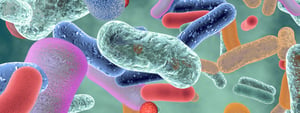There is a very close link between our immune system and intestinal microbiota (i.e. all the “good” bacteria that live in our intestines).
In practice, the amount and composition of bacterial flora (as we have said in the past) influence and shape the production of different types of cells that make up the body’s defences.
This general information has been known for a long time, but the exact details of how it works are not so well known.
Now, however, a major study, whose results have been published in the scientific journal Nature, means that many crucial aspects can be clarified.
This research was carried out by oncologists from the Memorial Sloan Kettering Cancer Center in New York, who started with an observation: when a patient with leukaemia or lymphoma has to undergo a bone marrow transplant (which contains the stem cells of the immune system), in order to eliminate the diseased cells, the marrow itself is destroyed by very aggressive chemotherapy. Which effectively resets the body’s defence system, but at the same time the bacteria in the intestine are also annihilated, due to the powerful antibiotics that are administered at the same time to patients to protect them from possible infections (since their immune system remains out of use for a few days).
If there are no complications, in the weeks following the transplant, the antibiotics are gradually reduced. So, the intestinal microflora begins to recover and restabilize slowly returning to normal. At the same time, the stem cells of the new marrow (taken from a donor) also begin to re-form, “producing” lymphocytes and other cells of the immune system.
Since Memorial Sloan Kettering is one of the main centres in the United States for bone marrow transplants, oncologists decided to take advantage of the large number of cases available to the hospital to study in depth how the creation of new bacteria in the intestine “intertwines” with the creation of new cells in the immune system: a truly unique opportunity.
They then analysed the blood and stool samples of more than two thousand patients undergoing a transplant (for a total of more than ten thousand samples), for whom they had clinical information and daily samples in order to check the performance of both the immune system and the microbiota in parallel.
They discovered there is a very precise relationship between the distribution of different species of bacteria and the development of immune cells and that changes take place very quickly. When a species of “good” bacteria increases or decreases, the repercussions on the cells of the immune system can be seen immediately.
This type of information could be very useful for dealing with possible imbalances, for example by strengthening a certain type of microorganism in order to drive immune response in a particular direction.
In other words, it will be possible, within certain limits, to steer the composition (and therefore the effectiveness) of the immune system by administering or “cancelling” certain types of bacteria.
However, new studies will be necessary. In any case, the database at Sloan Kettering has been boosted and continues to be enriched with the data of patients, which will provide a true wealth of information for future research.

